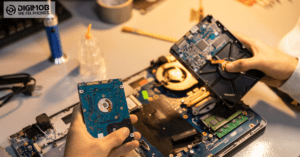As the leading mobile phone repair centre in South Australia Adelaide since 2002, we have witnessed firsthand the growing importance of effective smartphone security measures. In an increasingly interconnected world, smartphones have become central repositories for our personal information and sensitive data. Consequently, protecting your mobile data and privacy is crucial to ensure you avoid unauthorised access, identity theft, and various cybersecurity threats.
In this comprehensive guide, we aim to provide you with essential smartphone security best practices for various brands and models, including iPhone, Samsung, Sony, Nokia, LG, Oppo, Huawei, and HTC. By delving into topics such as robust password protection, secure app usage, and guarding against malware, we hope to empower you with the knowledge and tools necessary to protect your mobile data, personal information, and device against potential threats.
Smartphone security measures are not only increasingly critical as we rely more on our devices for communication, work, and entertainment, but they can also contribute to a continued trust in the evolving world of technology and digital services. By implementing these best practices, you can enjoy increased peace of mind that your sensitive data and mobile device are secure, regardless of how you use your smartphone.
So, let’s explore these essential smartphone security best practices, designed to protect your mobile data and privacy in today’s digital age, allowing you to utilise your device confidently and safely while maximising its potential.
1. Password Protection and Authentication
Robust password protection and authentication are critical in ensuring your smartphone’s security.
– Use strong passwords: Employ complex and unique passwords for your device’s lock screen and accounts. Consider using a password manager to store and generate secure passwords.
– Enable biometric authentication: Utilise fingerprint or facial recognition features, if available, as an additional layer of security for unlocking your device or authenticating certain actions.
– Two-factor authentication (2FA): Activate 2FA on your accounts and apps to protect against unauthorised access, even if your password is compromised.
2. Guarding Against Malware and Mobile Threats
Defending your smartphone against malware and other mobile threats is crucial in maintaining a secure device.
– Install reputable security software: Invest in well-regarded mobile security software to help protect your device from malware, viruses, and other threats.
– Keep software up-to-date: Regularly update your device’s operating system and apps, as these updates often include critical security patches and bug fixes.
– Avoid untrusted apps and downloads: Stick to official app stores and trusted sources for downloads, and review app permissions before installation.
3. Secure App Usage and Data Privacy
Taking care of the apps and data on your smartphone is essential, both for your privacy and overall device security.
– App privacy settings: Review app permissions and settings, adjusting them to limit access to your personal information when possible.
– Encrypt data: Ensure that your smartphone’s data is encrypted, providing an added layer of security for your personal information.
– VPN usage: Utilise a virtual private network (VPN) when accessing public Wi-Fi or cellular networks to protect your data transmission and online activity from prying eyes.
4. Lost or Stolen Smartphone Protection
Having safeguards in place in case your smartphone is lost or stolen can protect your personal information and help you recover your device.
– Enable remote tracking and wiping: Activate features such as Find My iPhone or Android Device Manager to track, lock, or erase your smartphone remotely in case of loss or theft.
– Physical security: Invest in a protective case, waterproof pouch, or other accessories to safeguard your device from physical damage and environmental threats.
– Backup data: Regularly backup your smartphone’s data to the cloud or external storage solutions, ensuring that you can recover your information even if your device is lost or stolen.
Embracing Smartphone Security for a Safer Mobile Experience
Effective smartphone security best practices are essential in protecting your mobile data and privacy in an increasingly digital world. By implementing these measures, you can confidently safeguard your personal information and device from potential threats, while enjoying the myriad benefits and conveniences that smartphones offer.
However, it’s important to remember that even with stringent security practices, incidents and problems can still occur – and that’s where our team at Digimob Phone Repairs is ready to help. As the leading mobile phone repair service centre in South Australia Adelaide since 2002, we specialise in all major smartphone brands and models, offering professional guidance and reliable repair services for any issues that may arise. Don’t hesitate to get in touch with us for expert support and assistance in maintaining a secure, efficient, and reliable mobile experience.


